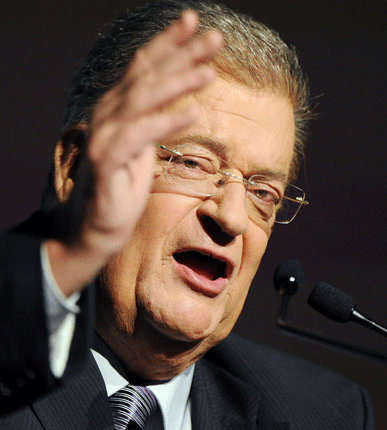Sarkozy's outspoken bête noire dies, aged 72

Your support helps us to tell the story
From reproductive rights to climate change to Big Tech, The Independent is on the ground when the story is developing. Whether it's investigating the financials of Elon Musk's pro-Trump PAC or producing our latest documentary, 'The A Word', which shines a light on the American women fighting for reproductive rights, we know how important it is to parse out the facts from the messaging.
At such a critical moment in US history, we need reporters on the ground. Your donation allows us to keep sending journalists to speak to both sides of the story.
The Independent is trusted by Americans across the entire political spectrum. And unlike many other quality news outlets, we choose not to lock Americans out of our reporting and analysis with paywalls. We believe quality journalism should be available to everyone, paid for by those who can afford it.
Your support makes all the difference.For a man who managed to insult the current President, a former pope and the entire French football team, the death of one of the country's most controversial politicians passed with a remarkable lack of bile.
Georges Frêche, 72, the former mayor of Montpellier who brought the political gaffe into his mission statement, died on Sunday with his personal popularity intact despite a career littered with insults, racism and abuse.
His victims included Pope Jean Paul II, Algerian soldiers who fought for France and Nicolas Sarkozy, whom he described five years ago as an arrogant pansy in platform shoes. He was widely considered to be the "bad boy" of French politics.
Frêche's most infamous comments were in 2006 when he said there were too many black players in the French football team. "Out of the 11 players, nine are black," he said. "Three or four would be normal."
As a result of his comments, Frêche of the faux pas was expelled from the Socialist Party. By the start of this year, the party had relented enough to support him in the run-up to regional elections, until he made an apparently anti-Semitic joke about former prime minister Laurent Fabius. "I wouldn't vote for him," he said. "He does not have a Catholic face."
Mr Frêche, who was the president of the southern Languedoc-Roussillon region, said later that the expression he used simply meant that he "looks shifty" but Mr Fabius was not convinced, particularly as it was not the first time Frêche had made such comments. When Israeli artists performed at the Montpellier Dance Festival, Mr Frêche compared Montpellier to an Israeli army outpost.
"It's true that he said some questionable things under different circumstances but I believe that now we must take a step back and remember that above all he was a positive force in his region and his town," Mr Fabius told French television channel Canal+ yesterday.
He was not necessarily kinder to Catholics. When Benedict XVI became Pope, Frêche said: "I hope he'll be better than that other moron."
Frêche's most recent controversy was to install five enormous statues in Montpellier honouring the "heroes of the 20th century": Lenin, Winston Churchill, Charles de Gaulle, Franklin Roosevelt and French socialist hero Jean Jaurès.
Mr Sarkozy's UMP party was particularly annoyed to see General de Gaulle standing in what looks like comradely intimacy with Lenin. Frêche responded by saying he was planning to commission a statue of Stalin. He had already commissioned five more for next year: Mahatma Gandhi, Golda Meir, Gamal Abdel Nasser, Nelson Mandela and Mao Zedong.
He demonstrated an original view of history elsewhere. In 2006, he criticised the Harkis, Algerian soldiers who fought for France during the Algerian War, for allying themselves with the French. "They massacred your people and you kissed their feet," he said. "You are sub-human, you have no honour."
Socialist politicians have paid tribute to him with varying degrees of enthusiasm. Not so Daniel Cohn-Bendit, the leader of the Europe Ecologie coalition, who once compared Frêche to Mussolini.
"His death is sad for those who loved him," he conceded on Europe 1 radio station. "But I maintain that as a politician he was execrable."
France's Labour Minister, Eric Woerth, said: "The death of anyone is always very sad. He was a political adversary and one always respects one's rivals. He went all the way with his ideas, which were sometimes a bit shocking."
Join our commenting forum
Join thought-provoking conversations, follow other Independent readers and see their replies
Comments